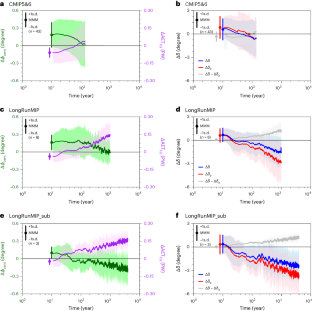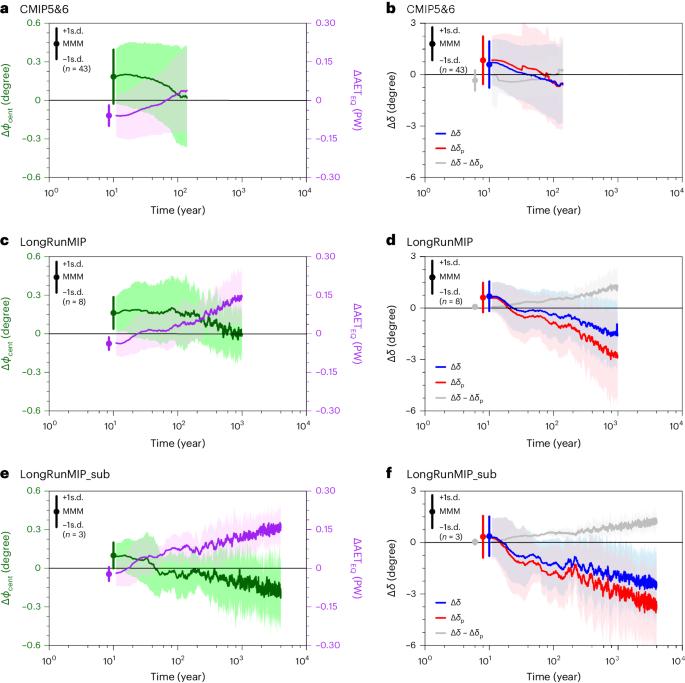热带辐合带迁移的快慢对比与南大洋变暖延迟有关
IF 29.6
1区 地球科学
Q1 ENVIRONMENTAL SCIENCES
引用次数: 0
摘要
热带辐合带(ITCZ)的移动对热带气候和社会有重大影响。在此,我们利用气候模式模拟研究了二氧化碳增加引起的热带辐合带迁移。在最初的一二十年里,我们发现热带辐合带的北移主要与大气中异常的南向跨赤道能量传输有关。在接下来的几百年或几千年里,ITCZ 向南移动。这种长期迁移与南大洋地表变暖延迟和海洋吸热减少有关,这改变了海洋吸热的半球间不对称性,并造成大气跨赤道能量传输异常北移。然而,赤道大气净能量输入的变化减少了约五分之二的 ITCZ 南移。我们的研究结果表明,(准)平衡ITCZ响应与瞬时ITCZ响应相反,从而突出了南大洋吸热对ITCZ长期演变的重要性。本文章由计算机程序翻译,如有差异,请以英文原文为准。


Contrasting fast and slow intertropical convergence zone migrations linked to delayed Southern Ocean warming
Migrations of the intertropical convergence zone (ITCZ) have significant impacts on tropical climate and society. Here we examine the ITCZ migration caused by CO2 increase using climate model simulations. During the first one to two decades, we find a northward ITCZ displacement primarily related to an anomalous southward atmospheric cross-equatorial energy transport. Over the next hundreds or thousands of years, the ITCZ moves south. This long-term migration is linked to delayed surface warming and reduced ocean heat uptake in the Southern Ocean, which alters the interhemispheric asymmetry of ocean heat uptake and creates a northward atmospheric cross-equatorial energy transport anomaly. The southward ITCZ shift, however, is reduced by changes in the net energy input to the atmosphere at the equator by about two-fifths. Our findings highlight the importance of Southern Ocean heat uptake to long-term ITCZ evolution by showing that the (quasi-)equilibrium ITCZ response is opposite to the transient ITCZ response. How the intertropical convergence zone (ITCZ) changes has strong effects on tropical regions. Here the authors show that while the ITCZ moves northwards over the first one to two decades of CO2 emissions, the long-term migration is southward, linked to delayed surface warming in the Southern Ocean.
求助全文
通过发布文献求助,成功后即可免费获取论文全文。
去求助
来源期刊

Nature Climate Change
ENVIRONMENTAL SCIENCES-METEOROLOGY & ATMOSPHERIC SCIENCES
CiteScore
40.30
自引率
1.60%
发文量
267
审稿时长
4-8 weeks
期刊介绍:
Nature Climate Change is dedicated to addressing the scientific challenge of understanding Earth's changing climate and its societal implications. As a monthly journal, it publishes significant and cutting-edge research on the nature, causes, and impacts of global climate change, as well as its implications for the economy, policy, and the world at large.
The journal publishes original research spanning the natural and social sciences, synthesizing interdisciplinary research to provide a comprehensive understanding of climate change. It upholds the high standards set by all Nature-branded journals, ensuring top-tier original research through a fair and rigorous review process, broad readership access, high standards of copy editing and production, rapid publication, and independence from academic societies and other vested interests.
Nature Climate Change serves as a platform for discussion among experts, publishing opinion, analysis, and review articles. It also features Research Highlights to highlight important developments in the field and original reporting from renowned science journalists in the form of feature articles.
Topics covered in the journal include adaptation, atmospheric science, ecology, economics, energy, impacts and vulnerability, mitigation, oceanography, policy, sociology, and sustainability, among others.
 求助内容:
求助内容: 应助结果提醒方式:
应助结果提醒方式:


